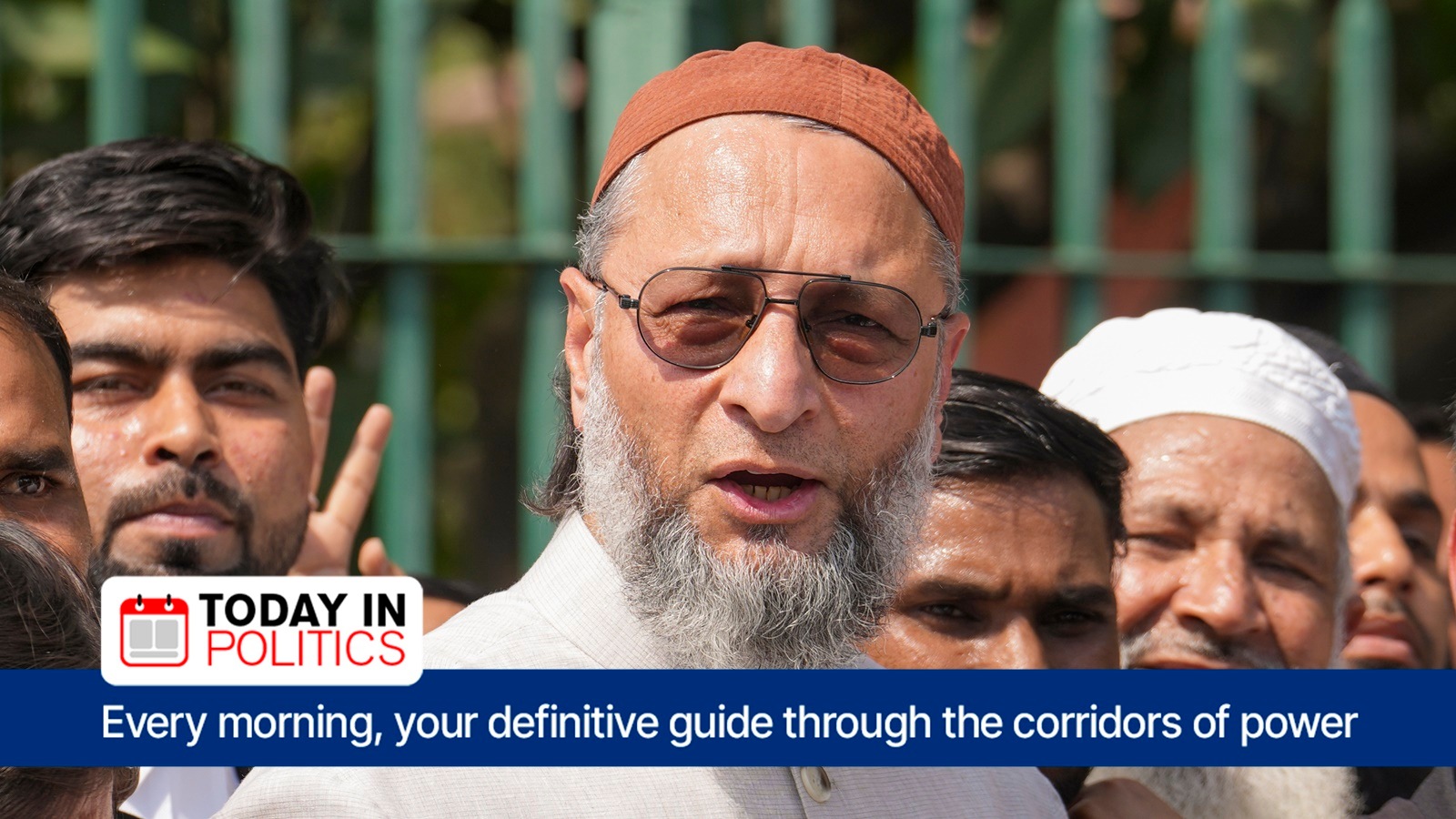Today in Politics: AIMIM and All India Muslim Board to protest against Waqf Act
AIMIM chief and Hyderabad MP Asaduddin Owaisi filed among the first set of petitions against the law saying it “manifestly arbitrary, perpetuates discrimination on grounds of religion
 AIMIM Chief Asaduddin Owaisi speaks to the media outside the Supreme Court of India, in New Delhi, Thursday, April 17, 2025. (Source: PTI)
AIMIM Chief Asaduddin Owaisi speaks to the media outside the Supreme Court of India, in New Delhi, Thursday, April 17, 2025. (Source: PTI)In one of the largest protests against the contentious Waqf Act, the AIMIM and the All India Muslim Personal Law Board (AIMPLB) are organising a protest public meeting Waqf (Amendment) Act at Darussalam, the AIMIM’s headquarters in Hyderabad
AIMIM chief and Hyderabad MP Asaduddin Owaisi filed among the first set of petitions against the law saying it “manifestly arbitrary, perpetuates discrimination on grounds of religion, violates the Shariat Act and strips the Muslim community of the right to manage its own religious institutions”.
“The Amendment Act, 2025 marks a departure from this consistent progression towards affording greater protections to the rights of the Muslim community under Articles 25 and 26 of the Constitution and charts a new course of diluting the protections to Waqfs undermining the rights of the minority communities in its properties and expanding the interference of the State over waqf administration,” he said.
“This diminishing of protection given to Waqfs while retaining them for religious and charitable endowments of other religions constitutes hostile discrimination against Muslims and is violative of Articles 14 and 15 of the Constitution, which prohibit discrimination on the grounds of religion,” he said.
Owaisi contended that the law mandating that a person should be a practising Muslim for at least five years to create Waqf is in direct conflict with Sections 3 and 4 of the Muslim Personal Law (Shariat) Application Act, 1937 and “undermines constitutional protections under Articles 14, 15, and 300A of the Constitution, as it discriminates against recent converts by selectively preventing them from seeking religious merit immediately upon conversion by disposing of their property in a manner they deem fit.”
On Thursday, the Supreme Court deferred its interim decision on the pleas challenging the Waqf Act, 2025 to May 5. This came after the Centre sought time to file an affidavit defending the law, but assured the court it will not, till the next hearing, appoint non-Muslims to Waqf boards or change the character or status of any Waqf.
Senior Advocate Kapil Sibal, who led the arguments for the petitioners, essentially framed the law as violative of Article 26 of the Constitution, with the Parliament having interfered on “the essential and integral parts of the faith.” Article 26, a fundamental right under Part 3 of the Constitution, guarantees the freedom to manage the religious affairs of the citizens, and is subject to only three restrictions — public order, morality, and health.
Congress delegation in Murshidabad
A delegation of the Congress, led by its West Bengal unit president Subhankar Sarkar, will visit riot-affected Shamsherganj in Murshidabad district on Saturday and review the situation there, a party functionary said.
During the visit to Shamsherganj around 2 PM, Sarkar will be accompanied by Malda Dakshin MP Isha Khan Choudhury, AICC observer Amba Prasad and other party leaders, he said.
“We will go to the riot-hit areas of Shamsherganj and those around it tomorrow. We also have plans to visit other areas where there was violence,” the Congress party official told PTI.
Three people were killed during the violent clashes that erupted in the Muslim-majority areas of Shamsherganj, Suti, Dhulian, and Jangipur in Murshidabad district.
Many people fled their homes and took shelter in camps set up in the neighbouring Malda district.
The violence occurred amid widespread protests against the central government’s recent amendments to the Waqf Act.
West Bengal governor CV Ananda Bose met people who have taken shelter in a temporary refugee camp after fleeing violence-hit areas of Murshidabad district.
He assured them that “proactive action” would be taken to address their grievances.
Recommended Reading: In Murshidabad, ‘absent’ Yusuf Pathan draws fire from Opposition, locals; TMC MP, MLA join in
- 01
- 02
- 03
- 04
- 05































